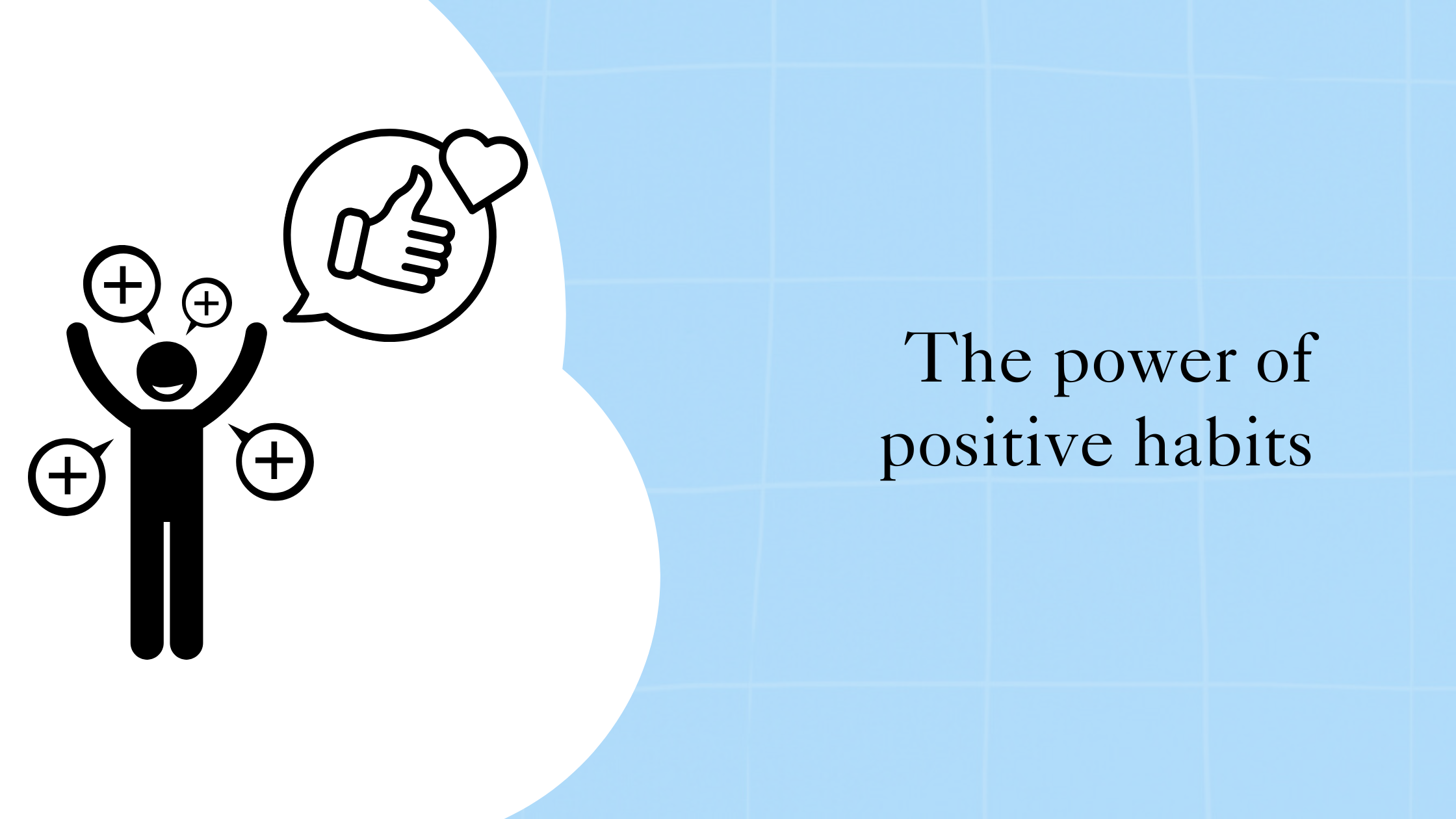Habits are an integral part of our daily lives, whether they are big or small, conscious or unconscious. They shape our days, our well-being, and often influence our lives more than we realise. Whether it's our morning routine, our food choices or the way we deal with stress, our habits create the structure in which we live each day. But what if we learned to shape them to improve our mental and physical health?
Adopting positive habits is not simply a matter of self-discipline. Research shows that they have a direct impact on our general well-being. Habits such as exercising regularly, practising gratitude or maintaining a balanced diet are all powerful levers that promote mental resilience, reduce stress and strengthen our physical health. These actions, repeated daily, create anchors that help us to navigate through life's challenges with greater serenity and energy. On the other hand, harmful habits can drag us down, affecting our mood, our energy and even our interpersonal relationships.
In this article, we'll explore how to develop positive habits that support lasting well-being. You'll discover practical strategies for anchoring these habits in your daily life, and above all, methods for maintaining them over the long term. It's not just about starting strong, but creating changes that will last. Because it's by cultivating beneficial habits little by little that you can truly transform your life for the better.
Why are habits so powerful?
The science of habits
Habits are formed through a simple but powerful process called the behaviour loop. This cycle has three key elements: the trigger, the routine and the reward. The trigger is the element that initiates the action, such as waking up or feeling hungry. The routine is the action itself, whether it's having a coffee in the morning or meditating before bed. Finally, the reward is the satisfaction or relief felt after completing the action, reinforcing the desire to repeat the behaviour. Over time, this loop is reinforced, and what was initially a conscious effort becomes an automatic action, or habit. By understanding this mechanism, we can harness its potential to introduce beneficial habits into our lives.
Cumulative effects
Another reason why habits are so powerful is their cumulative effect. Each small habit, repeated regularly, may seem insignificant in the short term, but it produces remarkable results over the long term. For example, meditating for five minutes a day may seem insignificant, but after a few months it can completely transform stress management and mental clarity. Similarly, eating an extra piece of fruit every day or taking the stairs instead of the lift may seem like small actions, but they contribute to better health in the long term. Habits work a bit like investments; the more you practise them regularly, the more their benefits accumulate and grow over time.
Examples of positive habits
Certain habits have a particularly beneficial impact on our mental and physical well-being. For example, regular exercise, even in moderation, boosts not only physical fitness but also mood, thanks to the release of endorphins. Meditation and mindfulness are other practices that help to calm the mind and reduce anxiety. In addition, a balanced diet rich in fruit, vegetables and vegetable proteins can improve our energy and concentration. These habits, if adopted gradually and maintained, form the basis of a healthier, more fulfilling life.

How to develop positive habits
Start small
Developing a positive habit always starts with small steps. It's essential to set realistic, progressive goals to avoid exhaustion or frustration. For example, instead of committing to doing an hour of sport every day, start with 10 minutes of exercise, then gradually increase the duration. This not only makes the goal more attainable, but also boosts your self-confidence. Small daily victories motivate you to go further. When goals are too ambitious from the outset, the risk of giving up is higher, as they quickly become discouraging.
Choosing effective triggers
To introduce a new habit, it's crucial to choose a trigger that fits naturally into your daily routine. A trigger is an event or action that is already well established in your day and that will serve as a starting point for the new habit. For example, if you want to incorporate a few minutes of meditation into your routine, you might decide to do it after your morning coffee. In this way, the coffee becomes the trigger for the meditation. Associating a new habit with a specific moment or environment helps to anchor this new practice more easily in your life.
Repetition and consistency
Repetition is the key to transforming a behaviour into a habit. The more you repeat an action, the more automatic it becomes. But consistency is just as important. If you don't repeat the action regularly, the habit will have trouble forming. That's why it's crucial to be consistent, even if it's on a small scale. For example, reading a few pages every night before going to bed will eventually become second nature if you do it every day. What's more, consistency helps you get through the days when motivation may be lacking, because the action is simply part of your daily routine.
Setting clear intentions
To maximise your chances of success, it's essential to set specific, measurable objectives. A vague objective such as ‘I want to be healthier’ can be difficult to track and measure. Conversely, a clear goal like ‘I want to walk 30 minutes every day’ is both specific and easy to track. By clearly defining what you want to achieve and adding quantifiable measures, you can better assess your progress and adjust your approach if necessary. These clear intentions also reinforce your commitment to the new habit, which increases the chances of long-term success.
How do you maintain long-term habits?
The importance of intrinsic motivation
To maintain a habit over the long term, it is crucial to find intrinsic motivation, i.e. deep personal reasons that give meaning to the habit. For example, wanting to run every day simply to lose weight may not be enough in the long term. On the other hand, running because it makes you feel good, improves your mood and gives you energy to face the day is a much more lasting motivation. Focusing on the inner benefits, on how the habit contributes to your personal fulfilment, is essential if you are not to give up when motivation slumps.
Overcoming obstacles
No journey is free of obstacles. There will be times when fatigue, distractions or unforeseen circumstances will make it more difficult for you to stick to your routine. The key to overcoming these challenges is to anticipate them and prepare for them. For example, if you have a busy day and can't stick to your exercise routine, you could plan a shorter session. It's important not to fall into the all-or-nothing trap: every little action counts, even if it's less than initially planned. It's also useful to remember why you started and to allow yourself to temporarily adjust your expectations without feeling guilty.
Monitoring and adjustment
Regularly monitoring your progress is an excellent way of staying motivated and assessing what's working and what's not. Using a tracking chart, an app or even a simple notebook can help you measure your progress over time. By noting each small victory, you can see how you're progressing and this encourages you to keep going. If you find that you're struggling to maintain a habit, you may need to adjust your goals. For example, if running every day is too ambitious, you could change to three times a week to fit in better with your schedule. The important thing is to remain flexible and make adjustments when necessary without abandoning the overall objective.
Creating a favourable environment
Environment plays a key role in maintaining long-term habits. Surrounding yourself with positive influences can go a long way to helping you stay on track. This can mean joining a group that shares the same goals, surrounding yourself with people who encourage your efforts, or simply organising your space to support your new habits. For example, if you want to eat more healthily, you can organise your kitchen so that you have nutritious food to hand and avoid temptation. A supportive environment naturally encourages you to maintain your habits, as it reduces friction and makes action more accessible.
Tools and techniques to keep you on track
Mindfulness techniques
Mindfulness is a powerful tool to help you stay connected to your habits and goals. By practising techniques such as meditation, you develop a heightened awareness of your thoughts and actions, which can help you avoid automatic or negative behaviour. Taking a few minutes each day to meditate or simply breathe deeply helps you to stay anchored in the present moment and strengthen your connection with your positive habits. These practices also help you to better manage the stress and distractions that can sometimes derail your journey.
Applications and technologies
Today, digital tools play an important role in managing and monitoring your habits. There are many apps that allow you to track your progress, set yourself reminders and visualise your achievements. Apps like Habitica, MyFitnessPal, or Calm can help you keep track of your goals, whether it's your sports sessions, meditation or nutrition. What's more, smartwatches and activity trackers give you real-time monitoring, motivating you to stay active throughout the day. These technologies make your progress tangible and give you instant feedback, a key factor in maintaining motivation.
Social responsibility
Engaging with others can considerably strengthen your determination to maintain your habits. Whether it's through a support group, friends, or family members, having people to share your progress, challenges, and successes with creates an environment of accountability. For example, you could join a walking or meditation group, or simply share your goals with someone close to you. Being accountable to someone else can add extra motivation, especially at times when you might lose sight of your personal goals. Social involvement also fosters an atmosphere of mutual support, which makes the journey more enjoyable.
List of positive activities, affirmations and ideas for integrating positive psychology into your life
Positive activities to incorporate into daily life :
- Take a daily walk - promotes mental clarity and physical health.
- Keep a gratitude journal - Write down three things each day for which you are grateful.
- Volunteering - Helping others strengthens our sense of connection and well-being.
- Take a moment for positive reflection each evening - focus on the day's successes, no matter how small.
- Practicing Self-Compassion - learn to forgive yourself in difficult times.
Positive statements to use :
- « I am capable of overcoming any obstacle that comes my way. »
- « Every day is a new opportunity to grow and improve. »
- « I am at peace with my past and I am creating a bright future. »
- « I deserve to take care of myself and my well-being. »
- « I'm full of positive energy and I'm capable of achieving anything. »
Ideas for integrating positive psychology into everyday life :
- Setting realistic and challenging objectives - set goals that align your strengths with your passions and values.
- Celebrating small victories - Recognising and savouring each step forward, however small, boosts motivation.
- Practising positive visualisation - Imagining your future successes helps maintain an optimistic attitude and strengthens your commitment.
- Fostering positive relationships - Surround yourself with people who encourage and inspire you to be the best version of yourself.
- Using cognitive reappraisal - when faced with a challenge, reframe it as a learning opportunity rather than a failure.

Conclusion
Habits are powerful levers for transforming our long-term well-being. By understanding how habits are formed, starting small and choosing effective triggers, it becomes easier to make them a lasting part of our daily lives. Intrinsic motivation, managing obstacles, regular monitoring and creating a supportive environment all play an essential role in maintaining these habits over the long term. What's more, by using tools such as mindfulness, tracking applications and social support, we can all stay on track to improve our mental and physical well-being.
The biggest changes often start with the smallest actions. Whether it's drinking an extra glass of water, walking a few extra minutes, or meditating for five minutes a day, every step counts. We encourage you to start today with just one positive habit, and to persevere, even when the going gets tough. It's by building little by little that lasting transformations take shape.
If you'd like to learn more about managing well-being, or if you need more support in developing and maintaining your positive habits, we invite you to take part in our workshops at Mon Carrefour Web. Our programmes are specially designed to support you in this process, providing you with practical tools and resources based on proven techniques. Together, we can help you create lasting well-being.
Want to know more? Here are some links you might find useful
Article
The Familly Center - Healthy Habits: 8 Good Habits to Have in Life
Video
20 HABITS of a Positive Mind - Napoleon Hill - After Skool
Change Your Life – One Tiny Step at a Time - Kurzgesagt – In a Nutshell
If you would like to discover more content on personal and professional development, please click on this link to access other similar articles.

